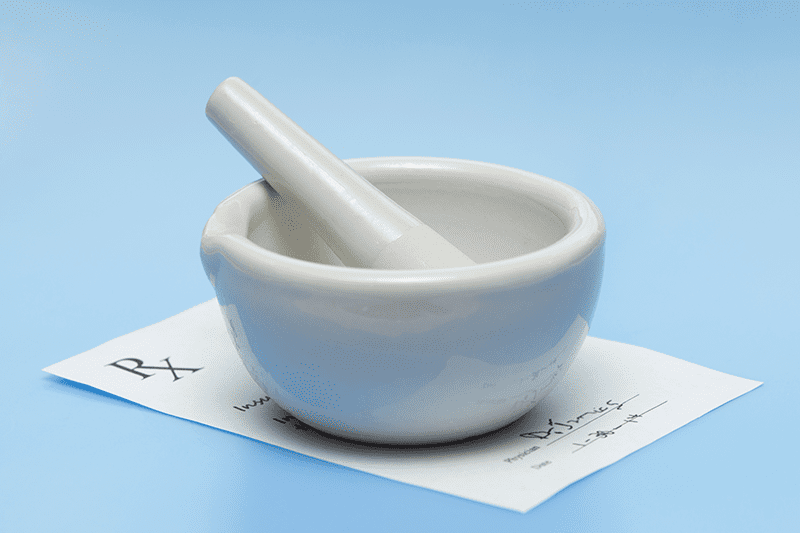By Janice Harvey, RPh, CDE
All pharmacies can prepare compounds, but not all pharmacies are certified to make all types of compounds, and some pharmacies do not do any compounding at all. We are often asked if we do compounding, and the answer is both “yes” and “no.”


Why get a medication compounded?
There are many reasons to have a medication compounded. For patients who need a customized dose or who are allergic to a component of the commercial product, such as the dye, a compounded medication can be essential. Compounded medications are also crucial for patients who cannot swallow a pill and need their medication in a liquid or other dosage form, such as a lollipop or gummy. Or when an oral medication is not appropriate, a topical medication might be compounded instead. Compounded medications may also allow a patient to continue treatment during times of drug shortages. As well, veterinary medications may commonly be compounded to achieve a much smaller dose or to include a special flavouring so that pets will take their meds.
The most common compounded medications include drugs for pain management (e.g., diclofenac) and hormone replacement (e.g., progesterone, estradiol, estriol, testosterone). It’s also common for dermatologists to request that a specific combination of ingredients be used to achieve better therapeutic results for various skin conditions.
Are there any concerns about using compounded medications?
Unlike commercially available products, compounded medications take time to make, so it may take a couple days from when you drop off your prescription before it is ready. It’s not possible to make compounds ahead of time, as they have a beyond-use date (BUD) based on the ingredients included in the compound. For example, where a commercially available diclofenac tablet may have an expiry date in a year or two, a diclofenac cream, gel, or ointment may need to be used within six months or less of the compounding date. Stability studies for the ingredients help us to determine the appropriate BUD for each compound.
Compounds are also more expensive due to the labour, specialized equipment, and additional knowledge required to create them. Many third-party insurance plans will not cover these costs, especially if it seems that a comparable product is already commercially available. You may need to pay the full cost. Billing for compounded medications is complicated, so most compounding pharmacies will bill you directly, and then it is up to you to submit your receipt to see if you will be reimbursed.
Are compounded medications safe?
In general, compounded medications are very safe. If drug quantity and dosing calculations are not correct or if a drug doesn’t dissolve well or uniformly, the resulting compound may not work as expected.
Safety issues are very unlikely when preparing a small compound for an individual patient. However, mass production in larger facilities has the potential for much bigger problems. In 2012, in the United States, distribution of a preservative-free methylprednisolone acetate solution that turned out to be contaminated resulted in over 700 fungal infections and more than 50 deaths. That same year, more than 1,200 patients in Ontario and New Brunswick were given weaker-than-prescribed doses of chemotherapy medications, which had been prepared by a compounding facility and then diluted with saline in hospital to create patient-specific doses.
These issues received much media attention and have resulted in both countries enacting new regulatory standards and guidelines. In Canada, the National Association of Pharmacy Regulatory Authorities (NAPRA) has set out standards for preparation of hazardous and non-hazardous, sterile and non-sterile compounds.
What compounds do we make?
As our pharmacy has a separate space for compounding, but it is not a separate room nor a room with its own ventilation system, we are limited to creating simple/moderate, non-hazardous, non-sterile compounds. There are three PCCA-certified compounding pharmacies in the Comox Valley that can create more complex compounds.
Hazardous drugs include those used for cancer chemotherapy, antiviral drugs, hormones, some bioengineered drugs, and other miscellaneous drugs. Various precautions can be taken to be able to handle them safely, such as working in a “clean room” or wearing non-permeable gloves, but many of these precautions simply aren’t possible in our small pharmacy. As such, we don’t create sterile compounds such as eye drops, nor do we compound medications used for hormone replacement therapy.
We are experienced at creating topical compounds, such as creams, gels and ointments used for inflammation, pain relief, fungal infections, eczema and other skin conditions. Through our relationship with Medisca, we have access to high quality chemicals and equipment, as well as an extensive formula database and compounding support.
We are proud of the compounding work we do. If you have a prescription that requires compounding, please ask us if it is something we can make for you. If it is not, we will refer you to one of the local compounding pharmacies that will be able to assist you. Your health is our priority. We will always do what we can to ensure you get the best possible care.
